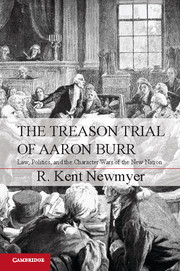Book contents
- Frontmatter
- Contents
- Acknowledgments
- Introduction
- Chronology of the Conspiracy and Associated Trial Proceedings
- Prologue A Mind-Jostling Trial
- 1 Jefferson and Burr on the Road to Richmond
- 2 Jefferson and Marshall Square Off
- 3 Legal Theater in Richmond
- 4 Treason Law for America
- 5 Judging the Judge
- Epilogue
- Index
- References
Introduction
Published online by Cambridge University Press: 05 October 2012
- Frontmatter
- Contents
- Acknowledgments
- Introduction
- Chronology of the Conspiracy and Associated Trial Proceedings
- Prologue A Mind-Jostling Trial
- 1 Jefferson and Burr on the Road to Richmond
- 2 Jefferson and Marshall Square Off
- 3 Legal Theater in Richmond
- 4 Treason Law for America
- 5 Judging the Judge
- Epilogue
- Index
- References
Summary
A leading constitutional historian called the Burr treason trial “the greatest criminal trial in American history and one of the notable trials in the annals of the law.” Edward Corwin did not explain why the trial was great and notable but several reasons come to mind. For one thing it involved a three-way legal, ideological, and personal contest among three prominent statesmen of the early republic. The clash between President Thomas Jefferson and his former vice president Aaron Burr set the case in motion, gave it a highly personalized and emotional cast, and defined many of the legal issues that emerged during the trial. President Jefferson’s extensive and unprecedented involvement in the trial proceedings, in turn, brought him into conflict with his old enemy Chief Justice John Marshall, who was sitting as a trial judge in the federal circuit court in Richmond, Virginia. Given the three-way battle that raged in Marshall’s courtroom, it is not surprising that historians have found the trial irresistible – and this is not to mention the mysterious intentions of Burr himself which the trial never fully revealed.
In addition to the leading figures involved, the legal and constitutional issues in the trial – the definition of treason, the constitutional rights of criminal defendants, and the meaning of separation of powers in the Constitution – have attracted the attention of constitutional and legal historians. Major biographers of Burr, Jefferson, and Marshall have also felt obliged to address the role their subjects played in the trial. As for Burr, it is tempting to make the study of the trial a study, if not of Burr himself, then of the “Burr conspiracy”; two pioneering scholars who chose this approach are Walter F. McCaleb (a revised edition of whose 1903 book appeared in 1936, followed by a further revision in 1966), and Thomas P. Abernathys (The Burr Conspiracy, 1954). Two outstanding biographies of Burr, by Milton Lomask (1982) and Nancy Isenberg (2007), also discuss the trial at some length. Jefferson’s response to Burr’s conspiracy and his involvement in the Richmond proceedings are treated at length in Volume 5 of Dumas Malone’s biography of Jefferson (1962). Leonard Levy’s Jefferson and Civil Liberties (1963) focuses critically on Jefferson’s role in the events leading up to, and including, the trial.
- Type
- Chapter
- Information
- The Treason Trial of Aaron BurrLaw, Politics, and the Character Wars of the New Nation, pp. 1 - 6Publisher: Cambridge University PressPrint publication year: 2012

